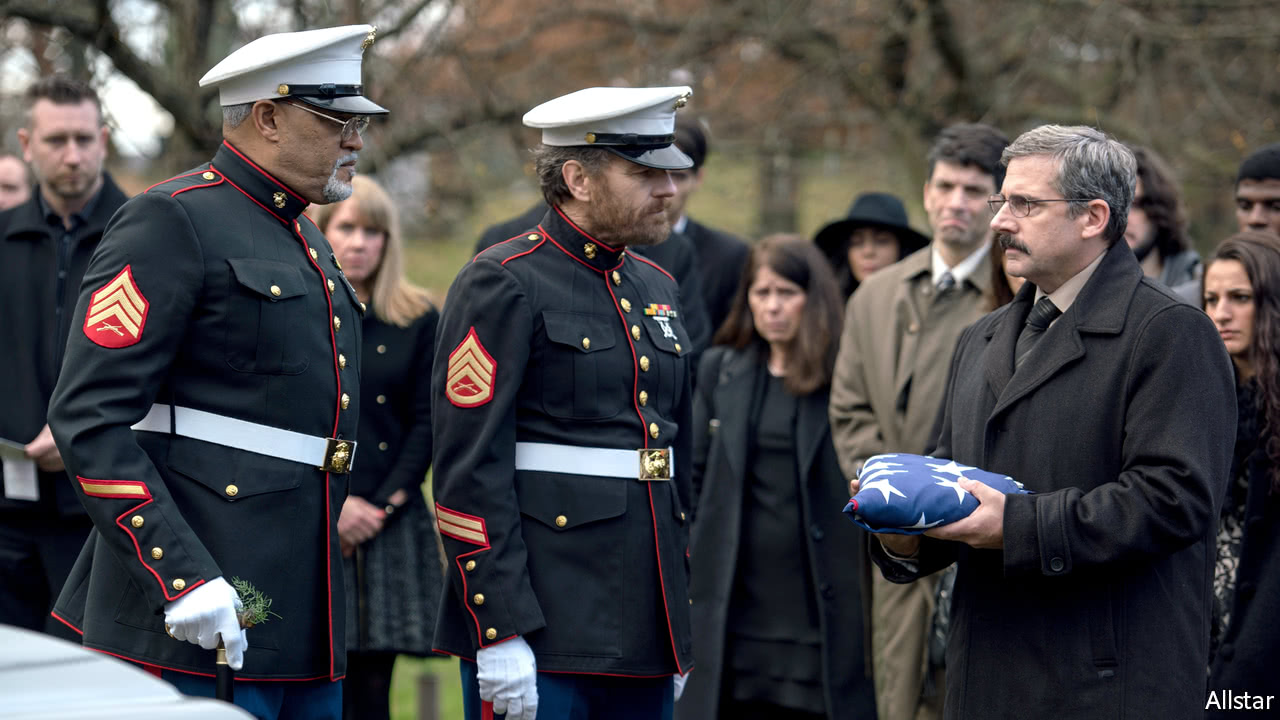Richard Linklater has spent his entire career as a director focusing on what connects people. Whether it be sports, food, religion, or the cliched “sex, drugs, and rock ‘n’ roll,” Linklater has always written his films with a narrow focus on these interpersonal exchanges that examine what it is to be a lover, a parent, a teacher, an authority, or even simply just a friend. Last Flag Flying, his latest, turns his lens to a familiar topic of male friendship but instead adjusts the spotlight from jocks and suburbanites of Austin, Texas to retired war veterans in the snow-covered North Eastern United States.
Nine months after the beginning of the Iraq War, Last Flag Flying follows Larry Shepherd, a widowed Vietnam veteran who seeks out two of his friends from his days in the USMC in order to help bury his son, Larry Jr., who was killed in action. Sal had since reenlisted and has owned a bar in Norfolk after his disability discharge left him with a metal plate in his skull. Mueller has become a Baptist preacher in a nearby town, but none had seen each other since an incident in the service put Larry in the brig in Portsmouth. Once the trio arrive at the base where his flag-draped coffin is delivered, Larry decides to bury his son next to his wife in New Hampshire instead of at Arlington National Cemetery. Along the way they purchase their first cellular phones, discuss Larry Jr.’s life with his best friend from the service (played by relative newcomer J. Quinton Johnson), and meet with the mother of one of the members of their unit who didn’t survive the Vietnam War. This leads the men to examine the current state of the United States, their own service, as well as their postwar lives.
While this might sound like a dry, harrowing emotional journey, it is far from it.
Linklater is an intimate filmmaker who lives and breathes for scenes of characters joking around and conversing, letting scenes breathe and focusing on the feeling of the scene rather than its thematic or plot importance. He’s a master of conveying complex interpersonal dynamics in a way that is naturalistic and earnest, and he’s in top form here. This isn’t to say there aren’t heavy and affecting scenes, but there is a levity that both eases the heartrendingly sad moments while also making them all the more moving.
This combination works both because of Linklater’s ability to control tone as well as the all-star cast putting in some of the best performances of their careers.
Steve Carell is the most shocking revelation here, with a performance that captures a sense of of grief and anguish and borderline depression. Carell’s Larry Shepherd is someone who is easily identifiable: an introvert who struggles with self expression and social anxiety, and Carell uses his offbeat comedic abilities to convey this in a humanistic and lifelike way: large sighs, slight hesitations before asking questions, looking around the room immediately after telling a joke to make sure he was understood, gesturing emotions through his eyes instead of his words. Things that most introverts do when they’re struggling to come out of their shell. There’s no big speechifying or cartoonish overacting here as has been the case in many of Carell’s previous dramatic roles. Instead, he’s plays Larry with a subtlety and a grace that creates an emotional anchor for the film.
Bouncing off of that understated performance are Bryan Cranston and Laurence Fishburne as Sal and Mueller, respectively. Cranston is the actor most playing his The Last Detail counterpart, channelling his best Jack Nicholson though he never becomes a caricature. Cranston delivers the film’s least subtle performance and Linklater smartly matches that performance with the script’s most distinct character arc, as the crass and misanthropic drunkard sees himself become more compassionate through his bond with Mueller and Larry. Fishburne, on the other hand, is much more modulated in his performance as Mueller, formerly known as “the mauler” because of his vulgarity, alcoholism, and depravity. Now a kind-hearted and devout pastor, Fishburne plays the role with a depleted spirit as his old friends bring out his former life that he is trying to leave behind. There’s both a rage behind Mueller’s eyes as well as an altruistic soul that Fishburne communicates with wonderful restraint. This is truly an actor’s showcase film, and all three lead performances are different variations of wonderful and the film shines when the focus is on the interactions between them.
That isn’t to say the film is flawless. The script feels like something that would have been written in the political climate of 2007, which gives a few of the scenes of governmental anger a quaintness that is jarring. There are also characters that either are sadly given the short shrift, like Mueller’s wife played by the Deanna Reed-Foster, as well as performances that are so cartoonish they’re cringe-worthy instead of comedically as intended, such as Yul Vazquez’s Col. Willits, the officer in charge of the military funerals who plays as a villain in a film that truly didn’t need one.
What is most remarkable is that combined with maybe the most talented set of leads he’s ever worked with, Last Flag Flying is able to be both one of the funniest films of the year whilst also working as one of the most emotionally stirring films of Linklater’s career. There’s an overwhelming melancholy that surrounds the whole affair, but the film isn’t saccharine or mawkish.
Instead, it builds its foundation on the lifelong friendships and brotherhood of service without becoming jingoistic.
It’s a fine line to balance, but Linklater, now almost three decades since Slacker exploded at Sundance, is more than adept at finding that thematic and tonal harmony.






